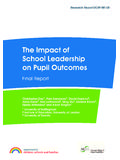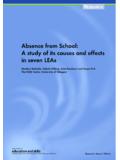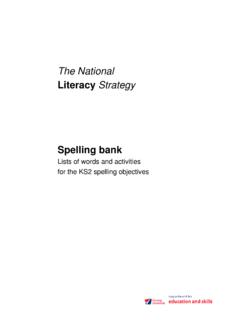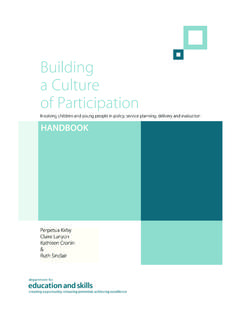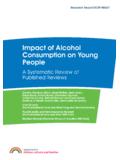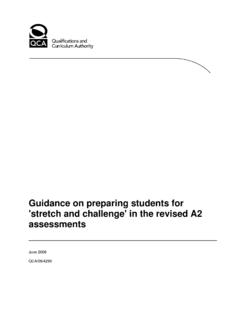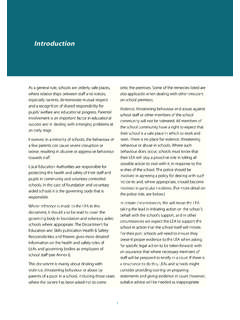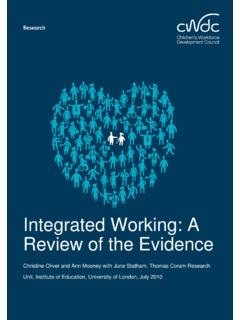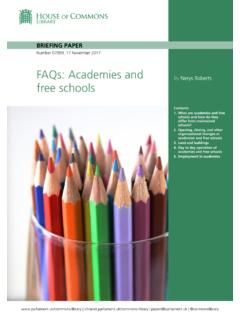Transcription of Parental Involvement in Education
1 Parental Involvement inEducationBridget Williams, Joel Williams & Anna UllmanBMRB Social ResearchResearch Report RR332 RESEARCHR esearch Report No 332 Parental Involvement in Education Bridget Williams, Joel Williams & Anna Ullman BMRB Social Research The views expressed in this report are the authors' and do not necessarily reflect those of the Department for Education and Skills. Queen s Printer 2002. Published with the permission of DfES on behalf of the Controller of Her Majesty's Stationery Office. Applications for reproduction should be made in writing to The Crown Copyright Unit, Her Majesty's Stationery Office, St Clements House, 2-16 Colegate, Norwich NR3 1BQ.
2 ISBN 1 84185 715 7 April 2002 Table of Contents Executive summary .. 1 1 Introduction .. 7 Study aims .. 8 Research Method .. 8 Arrangement of this report .. 9 2 Sample 10 Respondent selection and the weighted sample .. 10 The weighted sample 10 Marital 10 Respondent 10 11 Respondent working 11 Parents 11 Children in the 12 Special educational needs .. 12 13 3 General 14 The subjective measure: how involved do parents feel? .. 14 Whether parents would like more Involvement .. 16 Responsibility for 17 Practical Involvement in child s school .
3 18 Barriers to Involvement .. 21 22 How often the parent helps with 24 Confidence when helping with homework .. 25 Relationships with teachers .. 26 What parents talk about with teachers .. 27 Parents confidence when talking to 28 Attendance .. 30 school s attitude to parents .. 31 Summary .. 33 4 Awareness and understanding of Education 34 Home school Agreement .. 34 Awareness of other terms .. 35 Knowledge of school 39 40 5 42 How parents find out how child is getting on at 42 Quality of school s information.
4 43 How often receive written communication from school .. 44 Quality of written information .. 45 Ways in which written communication could be improved .. 45 External information sources .. 46 Whether found DfES sources 47 Whether done anything different as a result of advice in DfES 47 How to get parents more involved .. 48 Summary .. 50 6 Literature review .. 51 Method .. 51 General studies on Parental Involvement in Education .. 51 54 54 APPENDICES Technical appendix ..A1 Questionnaire: final version ..A5 1 Executive summary Introduction The Department for Education and Skills (DfES) commissioned BMRB Social Research to conduct a telephone survey of households containing children of primary or secondary school age (5-16) attending maintained schools.
5 The survey was designed to investigate the level of Involvement parents have in their children s Education and general school life. Key findings Around one in three (29%) parents felt very involved in their child s school life. Primary school parents were more likely to feel this way than secondary school parents. Mums were also more likely to say that they are very involved than dads. Around three quarters (72%) of all parents agreed that they wanted more Involvement , and a third (35%) definitely agreed. When asked about the barriers to becoming more involved parents cited the competing demands in their lives such as work commitments, demands of other children, childcare difficulties and lack of time generally.
6 Almost all parents were happy with the school s attitude towards them, with a large majority finding the school welcoming (94%) and willing to involve them (84%). Parents particularly value face-to-face contact with teachers. However, a significant minority (16%) felt that they would be labelled as trouble makers if they talked too much. Parents seem largely happy with the quality of written communication coming from schools, although a significant minority (27%) felt the general information as opposed to child-specific was spoilt by jargon.
7 Parents who had left school at 16 were most likely to feel this way. However, most parents (85%) were happy with the quality of information provided, saying that the school gives clear information about how their child is getting on. Many parents were unaware of the various labels given to recent Education initiatives. More than one in three (35%) did not recognise the term Home school Agreement , despite the fact that all of them should have been invited to sign one. 2 Aims The aims of the research were to establish: the level of Involvement parents have in their children s Education , focusing on.
8 Practical help in schools relationship with teachers Involvement with homework what parents perceive as barriers to further Involvement the awareness of Government initiatives and information sources how parents find out about their child s progress at school and what improvements they think could be made to communication with schools Background The Government s strategy for involving parents in their children s Education was first described in the 1997 White Paper Excellence in Schools , which recognised that pupils need support from parents to ensure they reach their full potential.
9 This strategy had three strands, around which the majority of the Department s work on Parental Involvement is based: Providing information to parents. Giving parents a more effective voice. Encouraging families to learn together. The Department has introduced a number of initiatives to encourage parents to become more closely involved in schools, including the following: Schools are required to produce Home- school Agreements, which are developed in consultation with parents. These Agreements set out the roles and responsibilities of both parents and schools in building up a partnership to raise standards in Education .
10 Schools are required to publish annual reports and prospectuses to allow parents to make informed decisions about their child s Education . Schools are also required to make at least one report per year to parents on their child s performance. 3 Parents are encouraged to have more of a voice in the way schools are run, for instance by taking part in home- school associations, or becoming parent governors. Parent Governor Representatives have also been elected to LEA Education Committees. The Department has also increased the amount of information available to parents, and has made this information more easily accessible.
